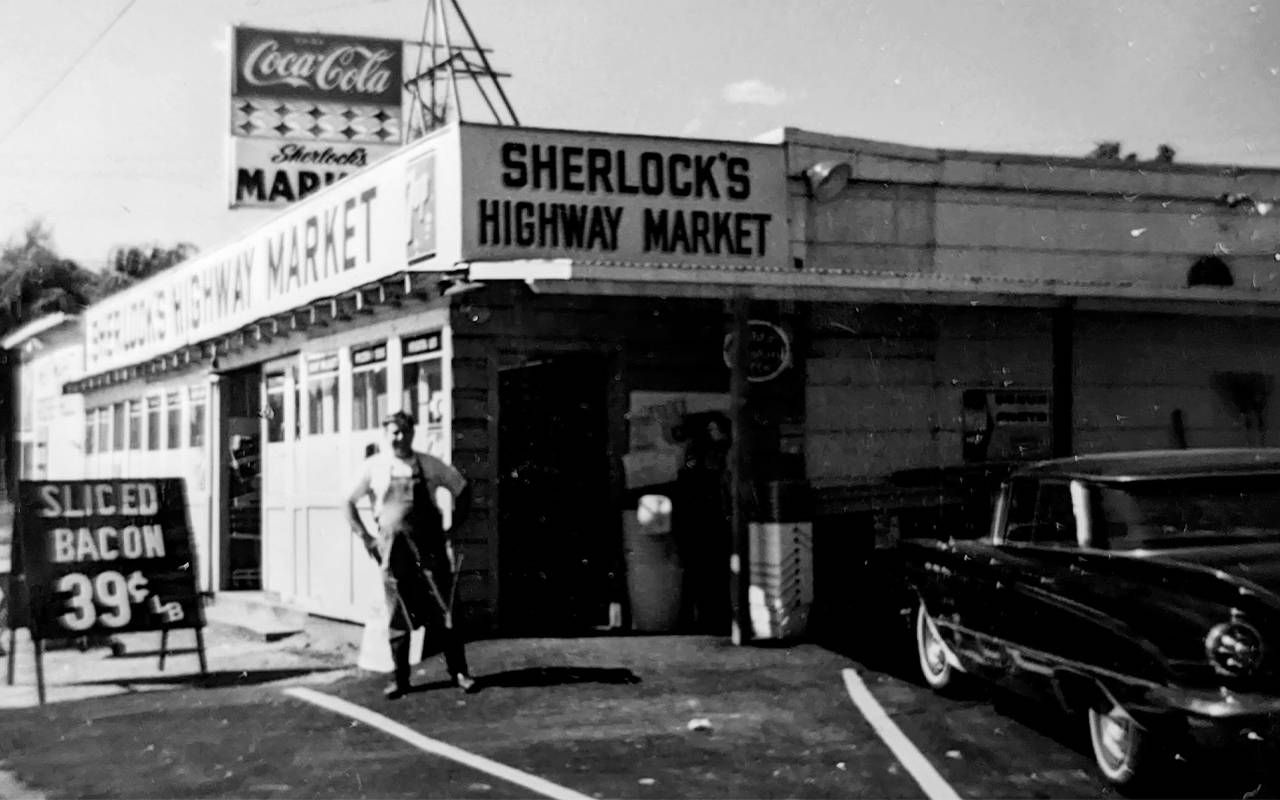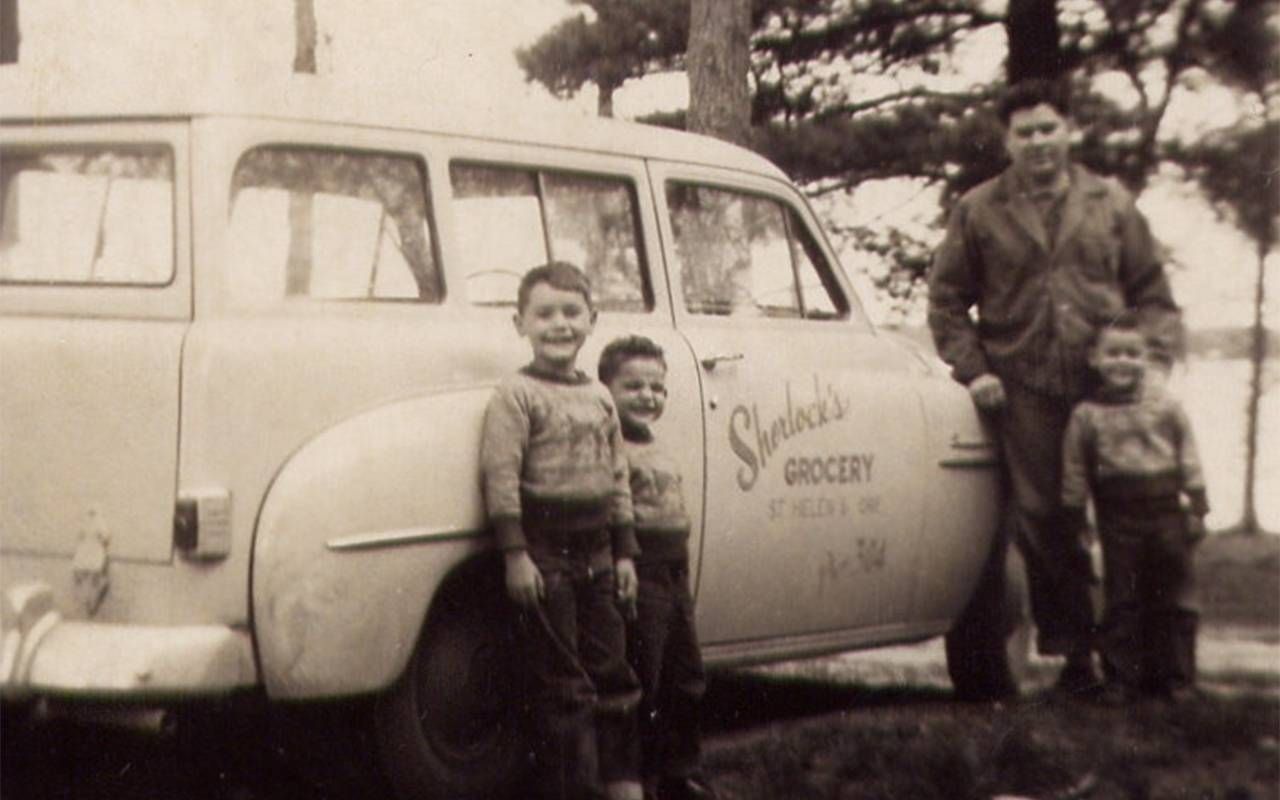'Mom and Pop' and Me
Owning a small-town grocery store in the 1950s and '60s didn't make my family wealthy but did give us a sense of community and purpose
Within a few years of my father returning from serving in World War II, he and my mother married, had three kids — and bought a modest "Mom and Pop" grocery store in the small town of St. Helens, Oregon. They both pitched in to make this fledgling venture succeed.
And it did. Those were the years when the neighborhood grocery store thrived.

The story of the rise (and fall) of my parents' business pretty much tells the tale of "Mom and Pop" stores everywhere.
A Grocery Store Primer
"Mom and Pop" groceries evolved from the general stores of the 18th and 19th centuries. At those establishments — where you could find everything from flour and molasses to kerosene and tools — customers handed a list of needed items to a clerk who gathered the products and wrapped them up. Early grocery stores — carrying only food — operated much the same way, with customers requesting items from clerks.
"Mom and Pop" groceries evolved from the general stores of the 18th and 19th centuries.
Then, in 1916, Clarence Saunders in Memphis, Tennessee, came up with the idea of "self-service" stores where the customers roamed the aisles with their handheld "shopping baskets," picking out products. Saunders named his store Piggly Wiggly. (You've gotta LOVE that name!)
In the 1930s and '40s, "chain stores" such as The Great Atlantic & Pacific Tea Company, Winn-Dixie, Kroger and Safeway caught on. (Piggly Wiggly had 2,660 stores in 1932.) But "Mom and Pop" stores still dotted the landscape.
Mom and Pop Open Store(s)
This was the environment in which my parents — with three kids under the age of 3 in tow — opened their own "Mom and Pop." They were, in essence, pursuing the American Dream.
Here's the rub: At first, to save money, Mom, Dad and those three kids lived in the back of the store. The total area of the building was just over 4,000 square feet. That included their makeshift living quarters.
Within a few months — I'm sure Mom put her foot down because she was caring for three kids in diapers — they'd moved into a house across the street from the store. They added two more kids while living there.
Everyone Pitches In
Sherlock's Grocery was typical of that era. It had a "full service" meat market where Dad, a butcher by trade, spent most of his time, cutting up beef, lamb and pork "to order" for customers. There was a produce section, a dairy case and four aisles of general grocery items. A checkstand stood in the center of the store near the entrance. You'd find Mom there when she wasn't herding kids.
A checkstand stood in the center of the store near the entrance. You'd find Mom there when she wasn't herding kids.
In the mid-'50s, my dad's younger brother started working at the store. They formed a partnership and soon bought a second store in a neighboring town. Ultimately, I think my dad's dream was to own a chain of stores. Why not? If Piggly Wiggly could go from one store in 1916 to 2,600 in 1932, why couldn't there be a handful of Sherlock's Groceries?
But that didn't happen. By 1960, my dad and uncle had decided that they should run the two stores separately. Dad took over ownership of the second store, in Scappoose, Oregon, population 923.
Treat Neighbors Like Family
That store — where I spent most of my time — was twice the size of the first and carried many more products. Dad would also "special order" anything customers might want; those items could take a non-Amazonesque two or three weeks to come in. But Dad's (unofficial) motto was, "If we don't have it, you don't need it."
That guy was a prophet.
Mom and Dad allowed customers to buy groceries on credit, never charging interest or badgering anyone to pay up. That might not be the best business practice, but it's certainly a sound quality for human beings.
Siblings Do Their Part
While our first task (sweeping floors) probably didn't contribute much to the running of the business, I think all of us kids knew — as we got older — that our help was important, that we were important.
By the time we were 8 or so, we worked in the "bottle shed" — an improvised lean-to behind the store where we sorted bottles, returned for their two-cent deposit, into the appropriate wooden crates labeled Pepsi, Seven-Up, etc.
We began bagging groceries at about age 10 (eggs and bread on top!). Soon we were stocking shelves. Each item had to be priced with an ink "stamper" because there were no barcodes back then.And we had to "face" the cans — so the front of the cans could be seen by customers.
Another child-friendly task — a meat market chore that did not involve sharp knives or electric saws — was wrapping beef, pork and chicken for the meat case. Later on, Dad taught us how to (carefully!) grind hamburger and cut up chickens. We were, essentially, pint-sized butcher's assistants.
I must say that I can't really grasp how my mom tolerated all of us helping out in the meat market. But we all survived. And we learned important life skills in the process.
The Perks of a 'Mom and Pop'
I don't remember being paid for these chores. But there were so many other perks.
One was the vibe of the store. No one rushed — there was always plenty of time to catch up with neighbors and friends. There were constant deliveries of products — from produce and sides of beef to canned goods and bread. You knew what was arriving by which weekday it was.

My far-and-away favorite day was Tuesday, when the Comic Book Guy came. I'd rush through my chores — and then devour the latest offerings. This was a huge perk for me! I love comic books to this day.
But my fondest memory was just being able to hang out with my dad. He worked such long hours that we rarely saw him at home.
Dad was fun-loving and taught us that work didn't have to be drudgery. When bananas didn't get delivered, he'd put up a sign that read: "Yes, we have no bananas. We have no bananas today!" (a popular song from his youth). In the meat market, he made up names for items. He called chuck steaks "Texas T-Bones" due to their size and said low-cost pork jowl was "Poor Man's Bacon."
The Dream Dies
I learned another important lesson from my parents' store: The road to wealth in America is paved with a ton of good luck — being in the right place at the right time with the right partners.
In the late '60s, Dad had a chance to open a Thriftway store — a popular chain in our area that featured lower prices due to economies of scale. He declined. None of us kids remember why exactly. Most likely he simply didn't have the cash for the buy-in.
The Thriftway opened without Dad, and his business declined. Within a couple of years, he knew it was time to move on. In 1971 he sold his store at a considerable loss.
What Have We Gained?
Dad's small grocery couldn't compete with the lure of more and more products at lower and lower prices. That trend has continued. In the 1930s, a typical grocery might offer 1,000 items. Today Walmart Supercenters average 142,000 different products.
Yikes.
Are we better off now? I'm not sure. I agree with my dad's homespun assessment that we really don't need many of the (overwhelming) options that big-box stores offer. And the lower prices at those mega-stores come at a cost: The sense of community, of neighbors helping neighbors, of knowing where your food comes from have all been lost.
More's the pity.
The Stuff That Matters
My dad's name never made it into the history books — as, say, the owner of a chain of stores that was bought up for millions by Kroger. And our family never rose above our barely-working-class status.
But that's okay with me. I can't imagine having better role models for all of those values that truly matter: kindness, responsibility, community, integrity.
And here's a sweet postscript: That original Sherlock's Grocery, the one Mom and Pop opened in 1949? It still exists today, albeit as a quaint convenience store, harkening back to those earlier, simpler days.


